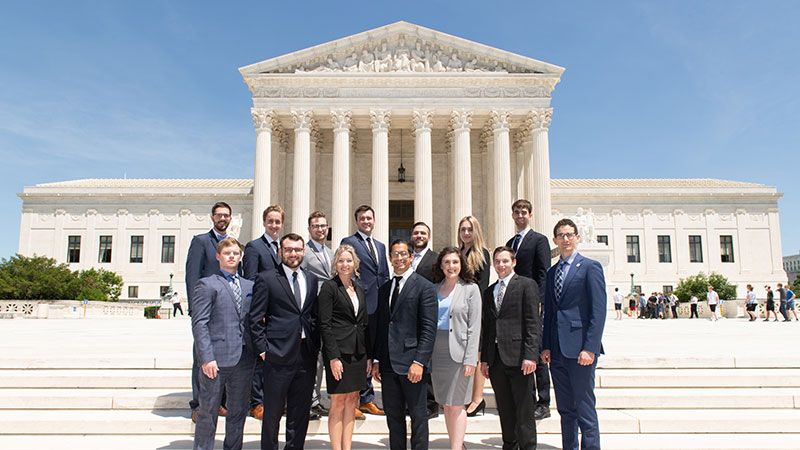
Each year, the TFAS Summer Law Fellowship provides students from top law schools across the country with the opportunity to attend exclusive guest lectures and networking sessions with our nation’s most prominent judges and legal professionals, and this year’s virtual program is no exception. Over the past two months, Fellows have heard from key professionals in their interest areas on topics ranging from constitutional originalism to campaign finance law.
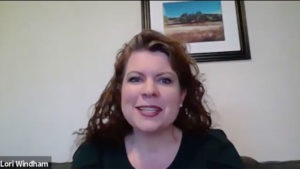
This June, Fellows virtually sat down with Lori Windham ’00 and Josh Holdenried, PPF ’18, for a discussion on “Religious Liberty Cases in Review.”
A TFAS alumna and Law Fellowship Board of Visitors member, Windham currently serves as senior counsel at Becket, a nonprofit, public-interest legal and educational institute committed to protecting freedom of expression for all faiths. With over 15 years of experience in religious freedom issues, Windham has represented clients in front of the Supreme Court and testified in numerous congressional oversight hearings. She led a discussion on the major religious freedom court cases in the U.S., and how these precedents will affect how the Supreme Court addresses the free exercise clause in the next presidential term. She believes that one of the biggest obstacles for the future of religious liberty in our country is largely dependent on the current state of political divisiveness.
“It’s been really disturbing to see the breakdown of the political consensus over religious freedom and people trying to turn that into a Right vs. Left issue,” Windham said. “As opposed to what it ought to be, which is something that protects Americans of all religions and political persuasions.”
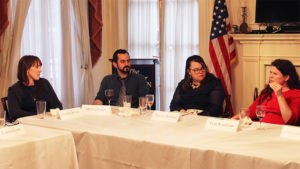
A TFAS Public Policy Fellow in 2018, Holdenried agreed that political targeting of religious organizations could pose a problem in the future as well. As executive director of Napa Legal Institute, Holdenried’s expertise focuses on the legal and financial education for faith-based nonprofit organizations to properly function in the public square. Holdenried cited a 2016 study by Georgetown University that reinforces the impact of religious organizations on the United States’ socioeconomic landscape.
“In 2016, Georgetown University found that religion contributes over $1 trillion per year to the socioeconomic health of the United States through social services, including but not limited to: education, health care, local congregational activities, charities, media and food,” Holdenried explained. “There are a lot of different faith traditions in the United States that, by virtue of their moral vision for the common good, are compelled to build and sustain these institutions that provide these social services to their neighbors.”
Georgetown University Law Center student Luke Bunting, Law ’20, said what he enjoyed most about the discussion was hearing expert opinions on a topic as complex and nuanced as religious freedom.
Getting an overview from the panelists on the current state of the law, the Supreme Court’s perspective, and recent and upcoming cases highlighted how the Supreme Court’s jurisprudence muddied the waters on religious freedom, and what will need to be done going forward to protect this important constitutional right.” – Luke Bunting, Law ’20
“Religious freedom is one of the most complicated and controversial areas of the law right now,” Bunting said. “Getting an overview from the panelists on the current state of the law, the Supreme Court’s perspective, and recent and upcoming cases highlighted how the Supreme Court’s jurisprudence muddied the waters on religious freedom, and what will need to be done going forward to protect this important constitutional right.”
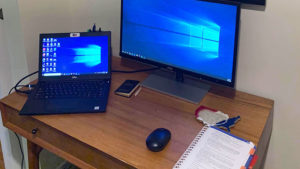
On July 1, students also had the chance to virtually meet with the director of social, cultural and constitutional studies at the American Enterprise Institute, Dr. Yuval Levin. An expert on the U.S. Constitution and political philosophy, Dr. Levin shared themes from his new book titled “A Time to Build: From Family and Community to Congress and the Campus, How Recommitting to Our Institutions Can Revive the American Dream,” which explores the many challenges facing institutions in our society today.
Levin argues that though institutions like family, church, politics and school have lost public trust over the years due to corruption or incompetence, they remain necessary and unifying components of American society.
“Each core institution in our society performs some important task. Each institution also forms the people within it to carry out that task responsibly and reliably,” Levin explained. “We lose faith in an institution when we no longer believe that it plays that ethical or formative role of shaping the people within it to be trustworthy.”
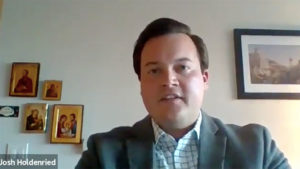
Levin believes that this mistrust is an essential argument for institutional reform in our country. As functional members of these institutions, he says Americans must take the first steps toward redefining their roles in society.
“The problem has to do with a deformation of our understanding of institutions and that each of us in the various institutions that we’re a part of needs to think differently about the role we have and about the obligations we have,” Levin said. “That sort of change of mindset would not be a substitute for institutional reform, but an essential prerequisite for it.”
American University Washington College of Law student, Heather McGuire, Law ’20, believes that Dr. Levin’s assessment of the political institutions in our country is a prime example of why institutional reform must take place.
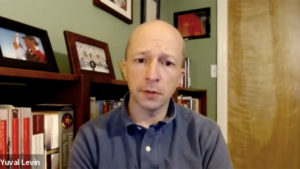
“I was most intrigued by Dr. Levin’s assessment of hyper-transparency and social media, and how each has turned the legislature into a theater,” McGuire said. “Because any uttered sentence from a legislator’s mouth could become a soundbite, many representatives have resigned to playing safe politics. I believe this is unfortunately a true indictment of many on either side of the aisle.”
Though the remainder of this summer’s Fellowship will continue online, Fellows still have the opportunity to hear from several key professionals in the legal field each week, including Judge Douglas Ginsburg, Ilya Shaprio of the Cato Institute, Todd Gaziano of Pacific Legal Foundation and Judge Neomi Rao. For more information on the TFAS Summer Law Fellowship, visit TFAS.org/Law.

